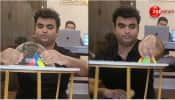New Delhi: Disruption of parliament is a safeguard against dictatorship but it is being used indiscriminately, political thinker Bhanu Pratap Mehta said Wednesday.
"Disruption of parliament is a safeguard against dictatorship but it is being used indiscriminately," said Mehta of the Centre for Policy Research.
"But it must be debated what issues should be used to allow parties to disrupt house," he said.
Mehta was speaking at a lecture organised by PRS Legislative Research on the functioning of parliament. Citing the example of the previous monsoon session, in which many legislations were passed, Mehta said it happened after both the Congress and the Bharatiya Janata Party (BJP) realised that continued disruptions could dent their image in the public eye.
Stating that many MPs were trying to figure out their exact roles in the parliamentary system, Mehta said, "There is difference in getting elected and participating in the legislative functioning of parliament."
Most MPs, he said, had been marginalised due to excessive centralisation of political parties, said Mehta.
"Parties are dependent on central leadership and most MPs are marginalised in the process," he said.
Jay Panda, Lok Sabha member from the Biju Janata Dal, pointed out that many a times the ruling party was behind disruptions.
"Around two-thirds of the time, the government is behind disruptions. They decide if an issue will be debated or not and whether it will be put to vote or not," he said.
He said this happens as there were 40 parties in the parliament, and building consensus among them on an issue was always difficult.
"Since each party has a veto on what issues could be discussed in the house, consensus is difficult to arrive at."
Noting "India is a functioning anarchy", JD-U member in the Rajya Sabha, NK Singh, said: "Lot of what happens in parliament is the result of cold calculus of numbers.
"We have to see whether such disruptions become regular and what is the way to find consensus on issues," said N.K. Singh.
According to Singh, many quasi-judicial institutions like electricity and telecom regulators, actually undercut the parliamentary supervision.
"Is it a drift in the right direction. These institutions have come out of parliamentary scrutiny," said NK Singh.
The former revenue secretary stressed that budgetary proposals, including tax proposals, should be discussed thoroughly in public before they go to parliament.
"Parliament gets very little time to go through them. For most parties, it is to accept the proposals or face instability as the government can go if a money bill is defeated," he said.
Comparing Parliament to a giant machine which could be supercharged with tweaking of some nuts and bolts, Panda too suggested laying bare the budget proposals before the people.
"The US president has to sell his policies to parliament every day. Here, the government can suddenly come up with a bill," said Panda.
"The government should not decide what can be discussed in Parliament. The role of the chief whips of various parties should be limited to money bills and no-confidence motions," he added.















